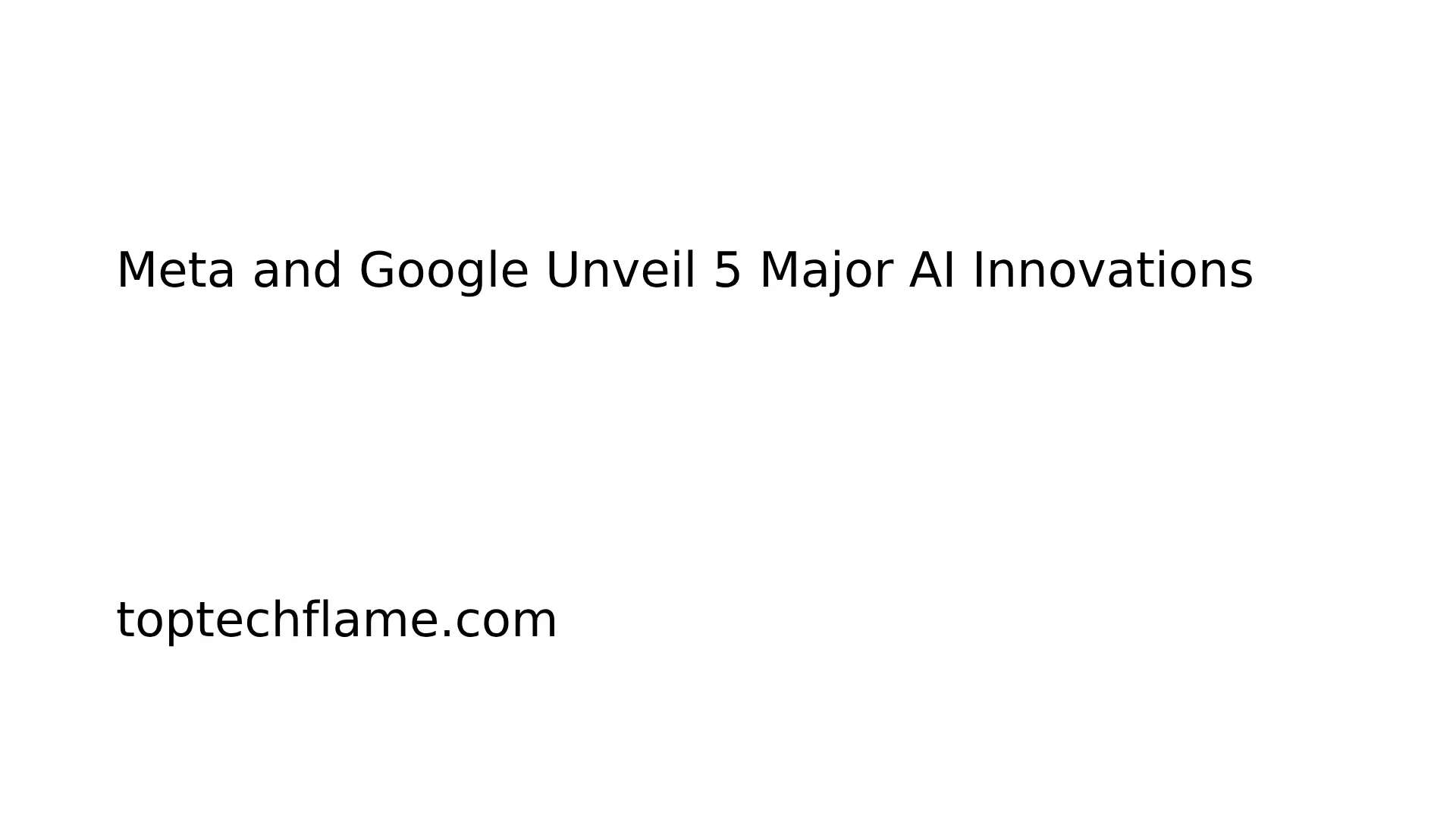Meta and Google
In the realm of technology, the highly valuable and constantly evolving field of Artificial Intelligence (AI) is changing the ways that companies engage with clients and consumers on the internet. Google and Meta , two of the most significant technology companies ,have recently unveiled five significant AI advancements, which will probably transform various industries, enhance various experiences, and progress the field of AI technology.
Here are five revolutionary AI innovations from Meta and Google, and why they matter:
1. AI-Driven Search Enhancements
Google and Meta were always ahead and now with the help of AI the technology has reached to a new height. One of the principal advancements is the launch of artificial intelligence updates to their search engine.
This new AI search offer most relevant results for intended searches as opposed to the lexical or keyword level analysis for Google and Meta. For instance, if you want to look for a complex search or asking questions in natural language like questions that are answered or questions that are asked, it does understand all the nuance of your question and provide better answers.
This enhancement will be useful and reduce search time to the users and provide better search results when the users search for specific content.
2. Advanced Language Models
Meta and Google has been concentrating on the two principal areas of making machines learn and produce human spoken and written language. One of their most prominent AI achievements is the application of progressive language models that will allow customers to perform actions such as translation and summarization with higher quality content creation.
AI models in the Meta environment include context, idioms as well as cultural breaks in conversation to show they have been trained on large datasets. This will make the bar of conversation higher within the several social media platforms and will offer the better services like automatic captioning along with the real-time translation of various languages.
The act of expanding the linguistic capabilities of these sorts of models will be a help to the everyday individual as well as to anyone who might otherwise need better means of expressing thoughts and ideas to reach those that they are targeted at.

3. AI in Healthcare
Both Meta and Google have also been channeling good resources into the application of AI in matters concerning healthcare. Of course, one of the most promising trends is the application of AI to the diagnosis and treatment of diseases. The AI applications developed by Google enable medical practitioners to diagnose illnesses through identifying patterns in medical images like X-rays and MRI, faster than a doctor’s eye.
Meta, on the other hand has shifted towards employing AI in anticipation of disease path among diseases such as Alzheimer’s. Since patterns can be determined in patient data, AI can assist care givers in making good plans on treating patients.
They could minimize human error in healthcare delivery, be time efficient and boost patient benefits, perhaps saving millions of lives.
4. Individualized Sources Suggestion
As for the idea of content curation in the context of individual users, both Meta and Google have not rested on their laurels, using AI technologies to enhance individual user experiences. Even Meta and Google as a major company using utilities such as Facebook and Instagram employ AI for refinement of content display. Through following each user’s activity, including like, share, comment, and time spent on specific post, Meta algorithms suggest what content may be of most interest to the user.
This system not only selects posts, videos, and ads that it sends to the user and the user sees, but also makes the relevance of recommendations grow with time. The more fire data is accumulated concerning users increased information search, the more accurate the suggestions get, providing one more delightful, personalized flow that seems to coincide with users’ logic.
Meta use of personalized content puts the emphasis not only on social interaction. Another advantage of their AI algorithms is optimized to present ads that will potentially appeal to certain populations. Given the highly detailed information about users’ activities, it is possible for the Meta and Google advertising system to guarantee the right product or service offering to the right target market.
And this precision targeting helps businesses as well, to target their pre-identified customers more efficiently. Many small businesses can leverage this AI-based product ad targeting to promote specific products to the relevant target groups, without overspending on general campaigns. Altogether, content customization and a focusing on the right ad associate each other to advance user engagement and provide more value to businesses.
Likewise, Google has advanced effective AI technologies to improve specific content presentation on its other products such as YouTube and Google News. Pertaining to timing and context, this means that Google is in the process of employing AI to predict not only what videos the users will watch and when, in addition to what their search queries are. For instance, concluding which videos will be most rewarding to the users, YouTube, with the help of recommendation algorithm, takes into consideration aspects such as viewing history, predisposing specificity of the videos previously watched, and regularities for viewers with similar preferences.
This approach makes sure the users continue to be active on the platform for a longer period by passing to them content they may otherwise not look for. Such a user experience allows a better engagement with the platform since people are offered entertainment or information that fits their preferences.
Google News also employs the untapped resilience of AI to filter many data to arrive at personalized articles. While other news aggregation sites post articles in a feed format or a stream, Google News personalizes the news it presents depending on users’ preferences, their history of what articles they read, and what their interests are.
This enables people to be able to follow information that is most relevant to them at the same time as being exposed to information that may be of interest in a wider sense. This increases the desirability of the site to the users and enables the user to expect updates from the site.
With the same regards to advertising, the use of AI algorithms also has made significant changes in Google. Like Meta and Google empowers various businesses to promote their products and services and address audiences with behavior and interests. The AI-automated ads targeting takes driver insight into account including history, location, and interactions with specific advertisements. Therefore, it becomes possible to target the services or products at the most likely users for the highest returns on advertisement expenses.
In both cases of Meta and Google the utilization of AI in tailored content really makes the content compelling and interesting for the user to continue scrolling as the content displayed is of specific interest of the user.
From this personalization, businesses are likely to gain better targeting since they can access the most suitable audience this will in turn enhance the conversion rates. This combined effect of personalization in terms of usability and strategic business objectives makes of artificial intelligence in the digital environment an extremely valuable tool.
5. AI for Environment and Sustainability
AI has also adopted a significant role in contributing to solving some of the ever-rising environmental problems in the world, with Meta and Google as the pioneers. Google, for instance, uses AI technologies to manage and optimize the energy use in its numerous data centers. These data centers that support Google Search, YouTube and host of other cloud applications consume a lot of energy.
AI employed in the operation of electrical energy in the Google company as a constituent of the artificial intelligence system for controlling the energy flow with eruptive deterministic of key factors including climatic conditions, loading factors, efficiency in the cooling system. In this manner, the power can be used optimally, and the AI can adjust energy used according to circumstances. This optimization has enabled Google to reduce carbon emissions, and work towards being a carbon neutral company.
Among the number of innovations involving artificial intelligence proposed by Google is the use of machine learning techniques to forecast the energy demand for data center. The entire system is designed to learn the historical data to understand the necessities of power consumptions and adjust it real-time.
Google has managed to achieve a more sustainable model of operation through integrating AI into these processes while at the same time showing how AI can be applied to solve real world problems that affect the world today such as Climate change. This invention is part of a huge drive in the technological sector to reduce the carbon footprint and Google’s vision has inspired other firms on the same.
Meta also focuses on environmental responsibility use of AI technology in calculating and minimizing the carbon footprints of its supply chain system. Energetic efficiency: the company aims at using lesser energy at all its facilities round the globe and lessen its discard output.
Thus, AI occupies a crucial place in these initiatives that would allow Meta to track its environmental footprint, as well as impact, in real time. This involves monitoring of energy consumption, examining supply chain information and helping to use resources better.
Another aspect of sustainability at Meta is to leverage AI to improve materials needed in construction and management of structures. An application of AI is in measuring the environmental repercussions used in the production of its products;this way, Meta selects materials that will be more congruent with its sustainable policy. To improve energy efficiency, it is trying to slash its carbon footprint and use artificial intelligence to help optimize these functions.
Also, Meta has utilized Artificial Intelligence to scale up various sustainability projects externally in its community projects. For example, Meta is applying its AI capabilities to make users and organizations minimize their own threats to the environment by offering solutions that track and optimize energy usage. This could include the AI designed systems that continuously monitor the energy use and provide recommendations on how to efficiency.
This way, AI positively impacts Meta and Google environments as various other technologies are used in attempts to lessen the adverse impacts of industrial and commercial processes. These innovations are significant to how the entities can enhance their operational performance and reduce their environmental footprint in a way that is beneficial for the global battle against climate change.
Therefore, it can be concluded that the AI development of Meta and Google is shaping the present sentiments in two ways ,that of recommending favorite contents and the constructive one, that of environmental consciousness. In this endeavor this trephination enhances the users’ satisfaction level and decreases the environmental footprint contributing to the way how these trephination can be used for business growth and responsibility.
Paid recommendations make the content more relevant to users while offering businesses more promising means of advertising AI applied to the revival of the sanitary method has already shown it can enhance the organization’s environmentally friendly outcomes. Future developments of AI are expected to reveal even more explicit possibilities in the fields mentioned above as well as to provide solutions to some of the global issues.
The Benefits of AI innovations
It is also seen that AI advancements, particularly by Meta and Google will have implications in almost all industries. These innovations range from enhancing how we look for data online and socializing to making a doctor’s job easier and even preserving our environment.
Looking at the advance of these organizations and the constant enhancement of the AI technologies then one can only imagine what is to come soon. Instead, these innovations will not only be useful to singular clients but also change the way companies address their logistics, making them run cleaner.
The Future of AI
AI is already a part of our lives and is going to play an even bigger part in them in the future. Meta and Google’s effort in pursuing advanced AI capabilities indicate that the range and effectiveness of these tools and solutions will increase further in future.
These innovations also have their down sides, and these are the pros and cons around AI and these include arising questions on ethics such as questions to do with data privacy and protection, rise the worry of the replacement of human personnel by the machines, and so on, the need to address and advocate for the right use of AI. These concerns have been acknowledged by both firms about how artificial intelligence will be used to benefit society.
In conclusion, the five major AI innovations presented by Meta and Google are the progress of the tech industry. In search technology, language models, healthcare, recommendation systems, and environmental sustainability AI has a brighter future.


